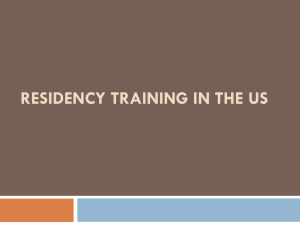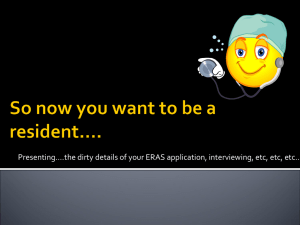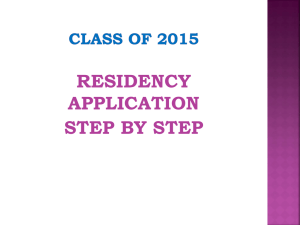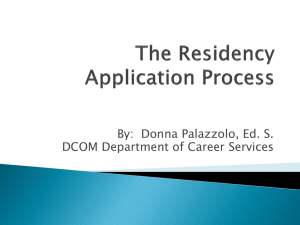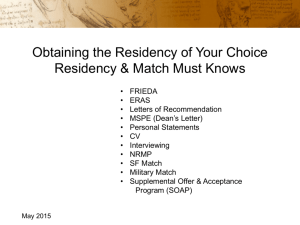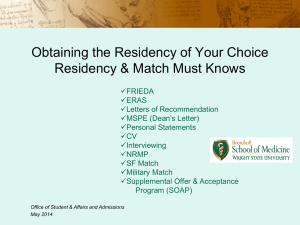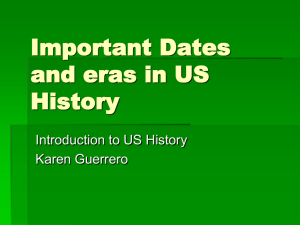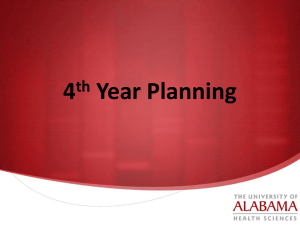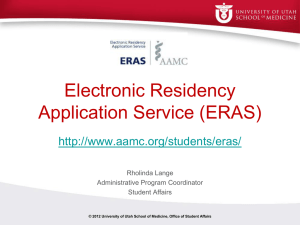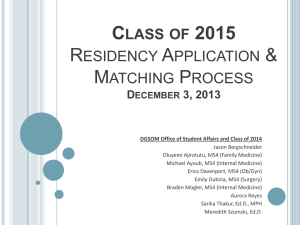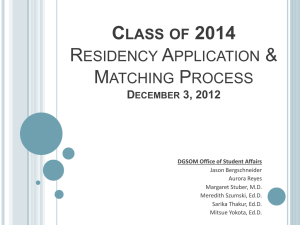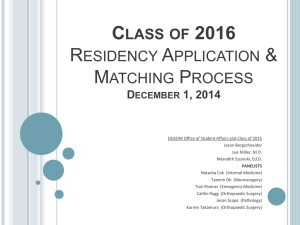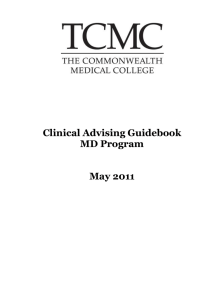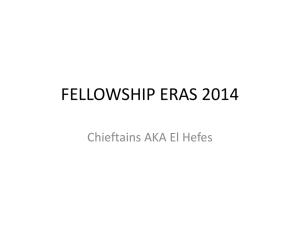RESIDENCY APPLICATION AND MATCH PROCESS
advertisement
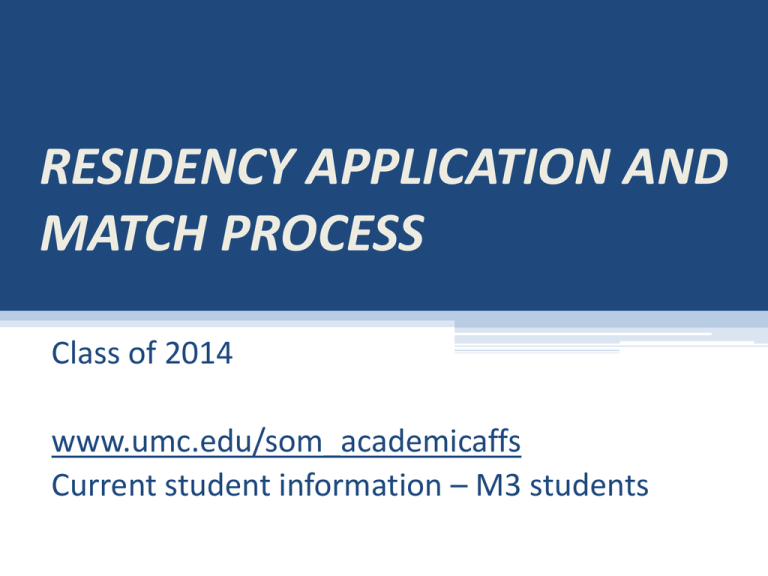
RESIDENCY APPLICATION AND MATCH PROCESS Class of 2014 www.umc.edu/som_academicaffs Current student information – M3 students General Information about Specialty Choice • There are more GME positions than there are U.S. graduates • Some overestimate the competitiveness of their specialty • Can go through this process applying to more than one specialty • Will receive a “Specialty Interest Form” at the end of March Deciding on a Specialty • Know the positive AND negative aspects of the specialty you are considering • To learn what a given specialty is all about, talk to people who practice that specialty • Consider what the specialty is like outside of UMMC - talk to outside physicians • Take, with a grain of salt, advice given to you regarding a specialty from individuals outside that specialty What to Do If Undecided • Schedule rotations early in which you are interested • Read about specialties Iserson’s Getting Into a Residency First Aid for the Match AAMC Choices newsletter https://www.aamc.org/students/medstudents/cim/ choicesnewsletter/ • Take a medical specialty aptitude test – www.med-ed.virginia.edu/specialties Application/Match Program Application Match Program • ERAS • NRMP • SF Match • SF Match and NRMP • AUA Match • AUA Match and NRMP • Military • Military National Residency Matching Program - NRMP • All students register • Keep the name you use when you register! • NRMP website - www.nrmp.org • Rank Order List - due February, 2014 • Match Day – March 14, 2014 Types of NRMP Positions • Categorical (C) – programs that begin in the PGY-1 year and provide the training required for board certification in medical specialties • Advanced (A) - programs that begin in the PGY-2 year after a year of prerequisite training • Preliminary (P) - one-year program that begin in the PGY-1 year and provide prerequisite training for advanced programs • Physician (R) - programs reserved for physicians who have had prior graduate medical education (not available to senior U.S. medical students) San Francisco Match • Ophthalmology match • Materials due in late August or early September • AA office uploads MSPE and transcript student submits their own application and supporting documents • Save all materials in an electronic format • www.sfmatch.org American Urological Association AUA • Urology match • Most programs use ERAS - a few have separate applications • Student submits their own application, MSPE, transcript and supporting documents • www.auanet.org Military Match • Programs use ERAS • Student submits their own application, MSPE, transcript and supporting documents • ROL due date will be given to student by military • Match results published in December Application Deadlines • Variable - You must look at individual program information (even within same specialty) • Regular Match September - submit all the parts of the application you control The more competitive the specialty, the earlier you should submit Program Directors can begin to review applications September 15th • Early Matches and Military From mid August to first week of September How Many Applications? • Look at comparison numbers • Depends on your competitiveness and the competitiveness of the programs to which you are applying • Not a one-size-fits-all process • You will discuss, in your dean’s letter meeting, the number of programs to apply to and number of interviews for which to shoot Application Materials • Your application represents you! • First impressions go a long way • Be neat and prompt – use correct grammar – check your spelling • Problems here indicate that you are sloppy, lazy, disorganized, pay little attention to detail • Program Directors look for clues to your character, personality, and style in the application itself • This is an email process – use official school address, not a cute or clever email address • Electronic Residency Application Service ERAS • Number of Programs Per Specialty Up to 10 = $92 11-20 = additional $9 each 21-30 = additional $15 each 31 or more = additional $25 each • • • • • Registration opens July 1st (we will remind you) ERAS - www.aamc.org/eras Generate a password that no one else will know No spell check - print out and proof Save a hard copy and electronic version ERAS/Common Application Form • Name, address, phone, email • School – name, location • Citizenship/race/ethnicity • Felony conviction, if any • Entire education history • Awards/honors • • • • • • USMLE scores Research/publications Volunteer work Work experience Language proficiency Previous residency training • ACLS – indicate yes • AOA - we will not know our AOA seniors when you start your application - leave blank and go back to add it in when the determinations have been made Application Components • • • • • • Curriculum Vitae Personal Statement Photograph Transcript Letters of Recommendation Medical Student Performance Evaluation (MSPE) • USMLE Scores - select in ERAS to have them sent automatically, keep in safe place “The Road to Match” Seminars Six seminars held in May and June, 2013 ERAS Application Process Curriculum Vitae Interviewing Letters of Recommendation Personal Statement Questions and Answers Curriculum Vitae • Provides information to include in the MSPE • Provides information for the faculty writing your letters of recommendation • A hard copy may be requested during interviews Two Versions of Curriculum Vitaes • Electronic version in ERAS for application • Hard copy version for letter writers • Use white paper • Recommended font size of 12 • May be more than one page • Be accurate on both versions What to Include in a CV • • • • • • • • • • • Personal Information (address, phone, email) Education (both undergraduate and graduate) Honors and Awards Licensure and Certification Research Experience Publications, Presentations, and Abstracts Employment/Work Experiences Leadership Positions Professional Memberships Extracurricular and Volunteer Activities Outside Interests Helpful Tips for Writing a CV • List information chronologically from the most recent to the most remote (be consistent) • Provide city and state for each institution • Show beginning and ending dates (ending date may be “current”) • Provide a complete timeline with no gaps • Don’t list an interest you don’t want to talk about! • Examples on AA website – current stud.info. Personal Statement • A good personal statement - sincere, reads well, creates a positive image of the applicant, and clarifies goals • Opportunity to explain your interest in a specialty and why you are a desirable applicant • Opportunity to explain any issues not previously explained (no need to address MCAT scores or multiple attempts at entry into medical school) • With few exceptions, shoot for normal • Not the forum to show your great sense of humor • Don’t make a big splash – it is usually ugly! Personal Statement (cont.) • Length - 1 page is best - must contain some really great information to go over one page • A personal statement that is too long is a sign to the program director that you talk too much • Spelling and grammar – be very, very careful • Any unexplained leave or gaps in time will be assumed to be BAD news • Examples on AA website – current stud.info. Photograph • Professionally done and recent • Professional dress – suit/tie for men, suit/solid color blouse for women • No tux - no scrubs - no rock-climbing attire • Make an appointment with Biomedical Illustrations – they will send your photo to Academic Affairs to scan into ERAS Letters Of Recommendation • Need 3 or 4 - some specialties require a chairman’s letter • Include one from any away rotations • From someone who knows you and has evaluated you clinically (not friends, family, pastors) • Have the option in ERAS to send different letters to different programs • LOR’s to Academic Affairs to be scanned into ERAS • Waiving your right to see the letter – yes or no? How to Request an LOR • Make an appointment with the letter writer • Take a CV, personal statement, and request for LOR/cover letter (online) • Ask them to write the letter but also give them an out Medical Student Performance Evaluation (MSPE or Dean’s Letter) • Comprehensive assessment of your performance in the medical school curriculum, as compared to your peers • Includes unique characteristics, academic history and progress, and narrative info. from the preclinical and clinical years • Released in ERAS on October 1st MSPE Meetings • Start in June • The following students will need to meet earlier o o Early matches - Ophthalmology, Urology, Military Competitive matches - ENT, Ortho, Dermatology • You MUST have a copy (draft) of your CV in hand for the meeting - it is advisable to also have your personal statement written What You Will Discuss • Specialty choice and desired interview locations • Contents of your MSPE, including unique characteristics, narrative comments, graphs of grades, and transcript • Any missing information in your file • Your competitiveness and best strategy • Your plan B From the Residency Program’s Side Via ERAS, Program Director’s screen for: • Clerkship grades, comments • Alpha Omega Alpha • Personal statement • Research • Second degree • LOR’s • Minority status • Language fluency • USMLE Step 1 – if you have a borderline score, the program director will be even more anxious to see your Step 2 score - prepare to take Step 2 early Red Flags to Program Directors • Time gaps • Course failure • USMLE failure • Negative LOR • Professionalism issues (HUGE!) • Unexplained leave • A “memorable “ personal statement • Unprofessional photograph • Applying in two or more fields • Unprofessional email address Program Directors are Looking for Someone who: • Plays well with others • Likes to work hard • Doesn’t whine • Is smart enough to pass boards • Has attributes to care for patients • Takes criticism well Program Directors Want to Avoid Someone Who Is … • Lazy • Unhappy and shows it • Selfish • Cut corners • Lies • A sociopath • Rude Your Impact on UMMC’s Reputation Program Directors never forget … • The student who lied to them (“You are my number one choice”) • Which school sent them great residents in the past • Which school sent them problem residents in the past When to Interview • Early or Late ? • No studies have shown a link between date of interview and ultimate position on rank order list The Interview Before • Review program web site • Prepare questions for the interview • Clinical experience • Commitment of the program to education of residents • People with whom you want to work • Cancel as early as possible if you decide not to go or can not make the interview During • Meet usually with the chair, PD, and other faculty members – usually have a “residents only” session After • Send a thank you note • Send follow up letter mid to late January if you have a strong interest “Do’s” For Interview Day • Be punctual • Smile • Avoid aftershave/ perfume • Dress professionally for the interview • Know about the program (look at web site before) • Attire: Male - suit, tasteful tie (err on the side of conservative) Female – suit, closed toe/heel shoes (not brand new), no purse Accessories/jewelry – the less the better “Don'ts” For Interview Day • Be rude to anyone • Show arrogance or disinterest • Ask inappropriate, unsophisticated questions • Make inappropriate attempts at humor • Leave early • Have poor attire, grooming, social skills • Show too much interest • Smoke or chew gum • Carry a coffee cup around all day • Play with your phone If You Didn’t Get An Interview • Make a call to the program director • Offer an intelligent reason why you should be considered • Politely ask them to reconsider and allow you to interview Second Look Visits • Generally not a great idea unless strongly encouraged by a program in which you have a strong interest • Overwhelms the program director • As an alternative, do an away rotation at that site Rank Order List • Don’t SUICIDE your rank order list • Class meeting in January, 2014 to discuss ROL in detail • NRMP ranking opens January 15, 2014 and closes the third Wednesday in February, 2014 Schedule Considerations • September – last month to do a rotation for a letter • October, November, December, January – interview months • January – last month to do a rotation to impact Rank Order List • February – Rank Order List due • March – Match • May - Commencement Residency Application and Match Process Checklist – 2013-2014 • A checklist of important events pertaining to residency application and Match. • The timeline runs from this point in your M3 year through the end of your M4 year. • This is a guideline, not a comprehensive list for every student. There may be other important tasks to complete your senior year which are not included • www.umc.edu/som_academicaffs - current student information, M3 students Resources • Getting into a Residency – Kenneth Iserson • First Aid for the Match • Program Directors @ UMMC • Interns and residents @ UMMC • ERAS - www.aamc.org/eras • NRMP - www.nrmp.org • San Francisco Early Match - www.sfmatch.org • Urology - www.auanet.org • Fellowship and Residency Electronic Interactive Database Access System (FREIDA) www.ama-assn.org
